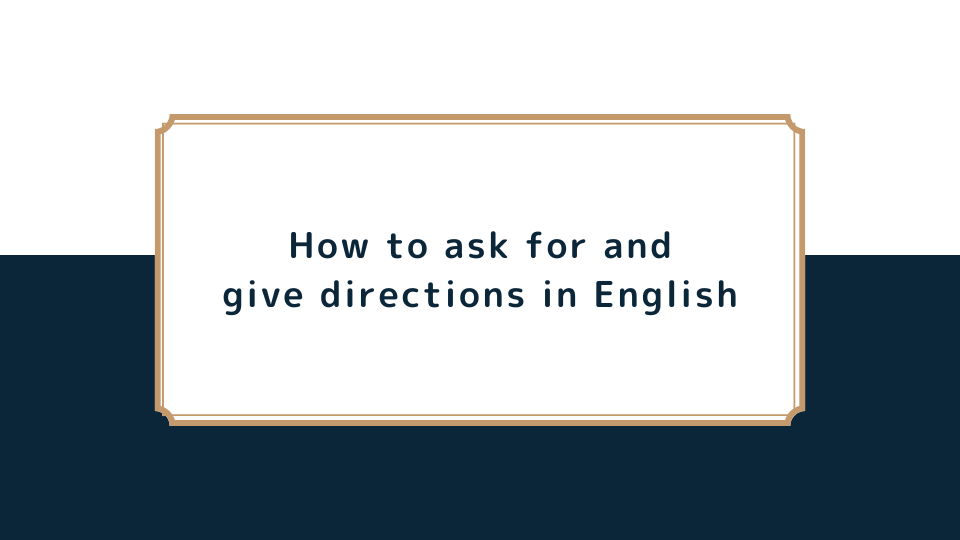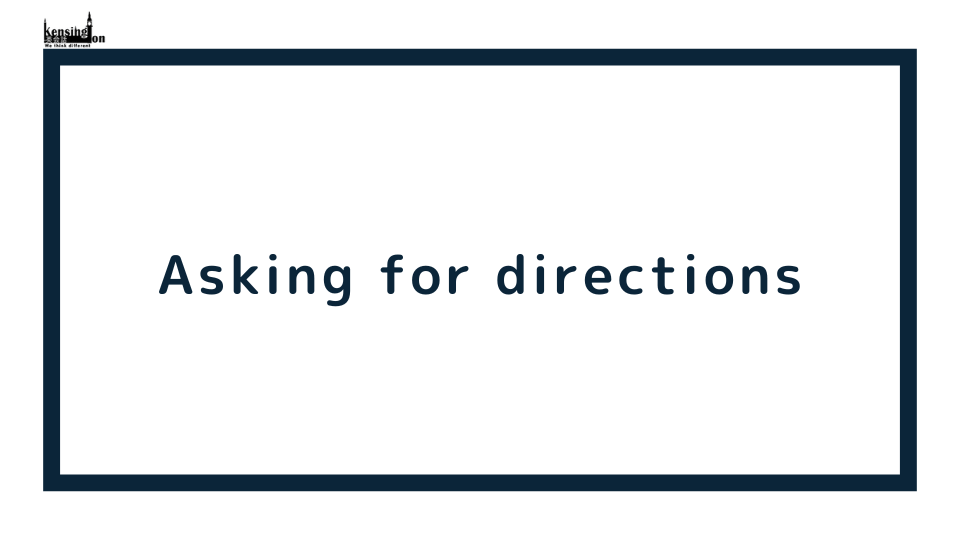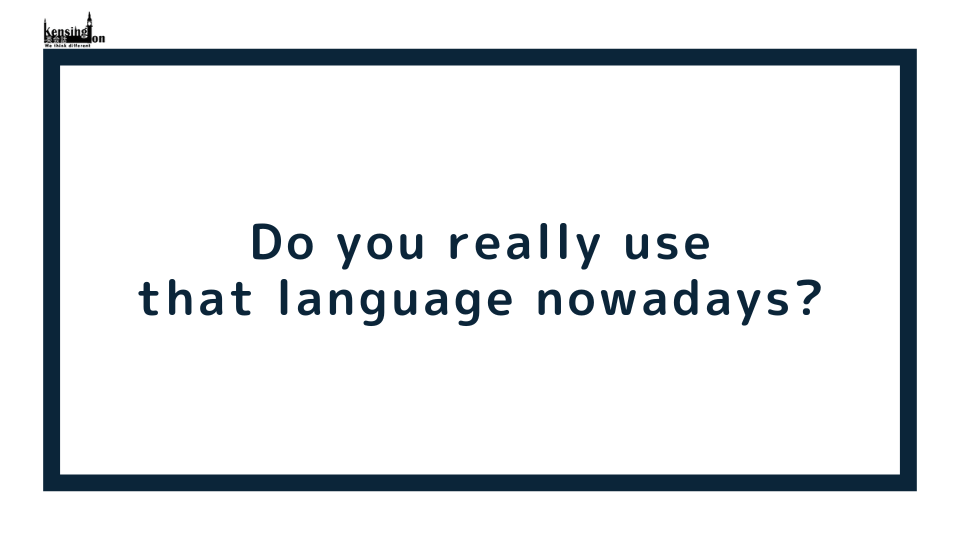
【Bartek先生】
皆さんこんにちは、Bartekです。
最近、母国のポーランドに帰省していましたが、行って帰ってくる間にもたくさん道を尋ねるシーンがありました。
旅行が好きな方も多いと思いますので、今日は英語での道の尋ね方と教え方について少しお話します。
直接的な質問と間接的な質問の仕方、その使い方、そして最後に福岡市内の人気スポットへの道案内の例文を見ていきましょう。
この例文は、道を尋ねられた際にも役立つフレーズなので、ぜひ参考にしてください。
それでは、早速始めましょう!
実践的な英語ならケンジントン英会話
ケンジントン英会話では、教科書には載っていない、生きた表現を身に付けることができます。
福岡市内の教室やオンラインで、経験豊富でフレンドリーな講師と一緒に英語を学びませんか?
実践的な英語を学びたい方はケンジントン英会話の公式サイトをチェック!
道を尋ねる

道を尋ねる質問文には、直接的なものと間接的なものがあります。
特に後者は文法に注意する必要があります。まずは、簡単な直接的な質問を見てみましょう。
Where is the station?
(駅はどこですか?)
Where can I find souvenir shops?
(お土産屋さんはどこにありますか?)
How can we get to the ABC hotel?
(ABCホテルまではどうやって行けばいいですか?)
これはわかりやすいですよね?
しかし「Do you know…(ご存知ですか)」「Can/Could you tell me…(教えていただけますか)」などを使って丁寧に伝えたいときがあります。
このようなフレーズを使うと、質問が間接的なものになり、文法に少し変更が必要です。
先ほどの直接的な質問を間接的に表現するとこうなります。
Can you tell me where the station is?
(駅がどこにあるか教えていただけませんか?)
Do you know where I can find souvenir shops?
(お土産屋さんがどこにあるかご存知ありませんか?)
Could you tell me how I can get to the ABC hotel?
(ABCホテルまでどうやって行けるか教えていただけませんか?)
文法が大きく変わったのがわかりますか?これが覚えておくべきポイントになります。
道を教える

次に、どうやって道案内をするか見てみましょう。
まずは徒歩を想定した道案内です。
「Go/Walk straight for about 200 meters(約200メートルまっすぐ進んでください)」や「Turn right/left(右/左に曲がってください)」といった表現を使います。
また、目的地がどこにあるかを伝えるために、「in front of A(Aの前)」「across from A(Aの向かい)「next to A(Aの隣)」「between A and B(AとBの間)」など、場所の前置詞を使うこともいいでしょう。
It’s on Watanabe Street.
(渡辺通りにあります。)
It’s between Seven-Eleven and Starbucks.
(セブンイレブンとスターバックスの間にあります。)
It’s across from Mitukoshi.
(三越の向かいにあります。)
It’s next to the Mizuho Bank.
(みずほ銀行の隣にあります。)
It’s in front of the city hall.
(市役所の前にあります。)
It’s on Watanabe Street next to the Fukuoka Bank.
(渡辺通りの福岡銀行の隣にあります。)
これらの表現を使って会話してみましょう!
A: Excuse me! Can you tell me where the bakery shop is?
(すみません、パン屋さんがどこか教えていただけませんか?)
B: Sure! Go straight, turn left, and the bakery shop will be between the souvenir shop and Seven-Eleven!
(もちろんです、まっすぐ行って(手を使ってもよし)、左に曲がって、パン屋さんがお土産屋さんとセブンイレブンの間にあります!)
A: Thanks!
(ありがとうございます)
B: No worries!
(どういたしまして)
公共交通機関を使って目的地に行く場合はどうでしょうか?「take 〇〇 line(〇〇線に乗る)」「get on/off at the 〇〇 station(〇〇駅から乗る/〇〇駅で降りる)」「Ride for 7 stops(7駅先まで乗る)」などの表現が使えます。
福岡空港での会話を例に見てみましょう。
A: Excuse me, can you tell me how I can get to Nakasu-Kawabata?
(すみません、中洲川端までの行き方を教えていただけますか?)
B: Yeah! Take the Kuko Subway Line. Ride for 4 stops and get off at Nakasu-Kawabata station
(もちろんです!地下鉄空港線に乗って、4駅進んだら中洲川端駅で降りてください。)
本当に使う…?

「スマホの地図アプリがあるこの時代に覚える必要が?」と思うかもしれませんね。
しかし私自身の最近の体験から、いかに役に立つかお伝えしたいと思います!
数週間前、ヨーロッパから日本に帰国する際、ベルリンの空港に向かうバスが予定より遅れてしまいました。
なんとか空港についたもののバス停が空港の建物から遠く離れていたんです!
焦りながらスマホを使おうとしましたが、インターネットが繋がらない!そこで、バス停に立っていた人に
「Excuse me! How do I get to the departures!?」
(すみません!出発ロビーまではどうやって行けますか?)
きっと私はとても焦った顔をしていたのでしょう。私を安心させるように言ってくれました。
「Don’t worry! It’s just a 3-minute walk! Go straight there (指をさしながら), turn right and you will see the airport entrance. Take the escalator to the 3rd floor. That’s the departures floor!」
(安心してください!ここから3分ほど歩けば着きます。まっすぐ行って、右に曲がると空港の入り口が見えます。3階までエスカレーターで上がれば、出発ロビーに着きます!)
と教えてくれました。
お礼を言って急いで向かう私に、最後に「Take care! Have a safe flight!」(お気をつけて!)と声をかけてくれました。
まとめ
この通り、今日学んだ表現は、とても役に立つことがわかりました。
皆さんはこういった状況に陥らないように願っていますが、ぜひこれらのフレーズを覚えて練習しておいてくださいね!
英語の勉強をしながら、素敵な夏の終わりをお過ごしください!
実践的な英語ならケンジントン英会話
ケンジントン英会話では、教科書には載っていない、生きた表現を身に付けることができます。
福岡市内の教室やオンラインで、経験豊富でフレンドリーな講師と一緒に英語を学びませんか?
実践的な英語を学びたい方はケンジントン英会話の公式サイトをチェック!
[英語原文]
How to ask for and give directions in English.
Hello again everyone! Bartek here. I’ve recently had a chance to go to my country, Poland, and on my way there and back to Japan I needed to ask for directions many times. I bet many of you will travel in the near future so today we will talk a little bit about asking for and giving directions in English. We will go over asking direct and indirect questions, using them to ask for directions, and finally we’ll take a look at some example sentences asking for and giving directions to some popular spots in Fukuoka City. That last part is an added benefit as these example sentences may be very useful when you are asked for directions on the streets. So, without much ado, let’s get into it!
Asking for directions.
It is obvious that asking for directions must involve questions. However, questions can be asked in a direct or indirect way and the latter requires some focus to be spot on grammatically. I guess we all know direct questions:
Where is the station?
Where can I find souvenir shops?
How can we get to the ABC hotel?
That’s all simple, isn’t it? Now, quite often we want to begin our questions with some polite phrases, such as “Do you know…” or “Can/Could you tell me…” Using such phrases makes a question an indirect one and requires a little tweak in grammar. Let’s take a look at the above direct questions in indirect forms:
Can you tell me where the station is?
Do you know where I can find souvenir shops?
Could you tell me how I can get to the ABC hotel?
Can you see what happened? Of course, you can! The question changed its syntax into that of a statement! And that’s the trick to remember and use.
Giving directions.
Okay, we know how to ask a casual direct question or a more polite indirect one but how do we give directions? Let’s start with simple directions that only involve walking. We may use expressions such as: “Go/walk straight for about 200 meters” or “Turn right/left.” It is also a good idea to say where the destination will be. For that, we will use prepositions of place: “in front of A”, “across from A”, “next to A”, or “between A and B.”
Here are examples of using the prepositions:
It’s on Watanabe Street.
It’s between Seven-Eleven and Starbucks.
It’s across from Mitsukoshi.
It’s next to the Mizuho Bank.
It’s in front of the city hall.
It’s on Watanabe Street next to the Fukuoka Bank.
Let’s see how we can use all those expressions in a conversation! Imagine you are at a place like a train station and someone asks you: “Excuse me! Can you tell me where the bakery shop is?” “Sure!” you’ll say, “Go straight (you can point with your hand!), turn left, and the bakery shop will be between the souvenir shop and Seven-Eleven!” They’ll likely say “Thanks!” to which you can respond with “No worries!”
Now, think about a situation when getting somewhere involves using public transport. We’ll need some more expressions such as: “take X line”, “get on/off at the Y station”, or “ride for 7 stops.”
How can we use that? Here’s an example! Imagine you are at Fukuoka Domestic Terminal and someone asks you: “Excuse me, can you tell me how I can get to Nakasu-Kawabata?” You can answer: “Yeah! Take the Kuko Subway Line. Ride for 4 stops and get off at Nakasu-Kawabata station!”
Do you really use that language nowadays?
You may wonder “Is that language worth learning in the 21st century when we all have our smartphones and maps apps with navigation?” Well, I understand that question and would probably ask it myself but I have a really recent and relevant experience to share that may convince you that those expressions are still very useful! A couple of weeks ago I was on my way back to Japan from Europe. I had to go to the airport in Berlin and I took a highway bus that was supposed to take me straight to the departures. The bus was stuck in traffic and there was less and less time until my departure. Then finally we got to the airport but the bus stop was far away from the airport building! I was a bit worried as my departure was in 90 minutes and I could not afford to miss the flight! I pulled my phone and tried to find the way to the departures but my phone just couldn’t connect to the internet! I needed to get directions fast so I asked the first person at the bus stop: “Excuse me! How do I get to the departures?!” I must have looked panicked cause that person replied “Don’t worry! It’s just a 3-minute walk! Go straight there (he pointed with his finger), turn right and you will see the airport entrance. Take the escalator to the 3rd floor. That’s the departures floor!” “Thanks a lot!” I shouted and went straight ahead. “No worries! Have a safe flight!” the person replied to which I showed a thumb up as I was already speedwalking.
Conclusion:
So, you can see that the expressions we learned today can be pretty useful and we may not even know when! I hope you won’t have to use them in a situation like mine but make sure you learn and practice them! Good luck and have a great late summer time!
~*~*~*~ \ Follow me / ~*~*~*~
Instagram : @kensington_eikaiwa
Twitter : @Kensington_Eng
Facebook : @kensingtoneikaiwa
YouTube : KENSINGTON英会話
~*~*~*~*~*~*~*~*~*~*~*~*~*
◆お問い合わせはこちら
ケンジントン英会話:お問い合わせフォーム








































 Brief 〜 on the latest news
Brief 〜 on the latest news






























